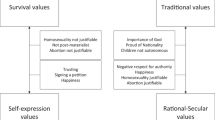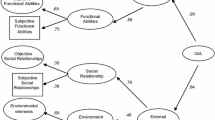Abstract
The purpose of this study is to understand the impact of health status and cultural participation upon psychological well-being, with special attention to the interaction between patterns of cultural access and other factors known to affect psychological well-being. Data for this report were collected from a sample of 1,500 Italian citizens. A multi-step random sampling method was adopted to draw a large representative sample from the Italian population. Subjects underwent a standard questionnaire for psychological well-being [the Italian short form of the Psychological General Well Being Index (PGWBI)], and a questionnaire related to the frequency of participation to 15 different kinds of cultural activities during the previous year. The results show that, among the various potential factors considered, cultural access unexpectedly rankes as the second most important determinant of psychological well-being, immediately after the absence or presence of diseases, and outperforming factors such as job, age, income, civil status, education, place of living and other important factors. According to a semantic map generated by a powerful data mining algorithm, it turns out that different factors (among which cultural access and health status in particular) may be viewed as concurrent elements of a complex multi-causal scheme that seems to play a primary role in determining psychological distress or well-being. In particular, distress seems to be tightly connected with: living in the Southern part of Italy, average income level, living in semi-urban and urban areas, age group 46–60, presence of more than two concomitant diseases and a low level of cultural access. Well being, on the other hand, is tightly connected with: male gender, high cultural access, and absence of diseases. Some of these associations are confirmed by Principal Component Analysis.







Similar content being viewed by others
References
Buscema, M. (Ed.). (2007). Squashing theory and contractive map network, semeion technical paper #32, Rome.
Buscema, M., & Grossi, E. (2008). The semantic connectivity map: An adapting self-organizing knowledge discovery method in data bases. Experience in gastro-oesophageal reflux disease. International journal of data mining and bioinformatics, 2(4), 362–404.
Buscema, M., Grossi, E., Snowdon, D., & Antuono, P. (2008). Auto-contractive maps: An artificial adaptive system for data mining. An application to alzheimer disease. Current Alzheimer Research, 5, 481–498.
Bygren, L. O., Johansson, S. V., Koonlaan, B. B., Grjibovski, A. M., Wilkinson, A. V., & Sjostrom, M. (2009). Attending cultural events and cancer mortality: A Swedish cohort study. Arts & Health, 1, 64–73.
Cohen, G. D. (2009). New theories and research findings on the positive influence of music and art on health with ageing. Arts & Health, 1(1), 48–63.
Cohen, G. D., Perlstein, S., Chapline, J., Kelly, J., Firth, K. M., & Simmens, S. (2006). The impact of professionally conducted cultural programs on the physical health, mental health, and social functioning of older adults. Gerontologist, 46(6), 726–734.
Daykin, N., Orme, J., Evans, D., Salmon, D., McEachran, M., & Brain, S. (2008). The Impact of participation in performing arts on adolescent health and behavior: A systematic review of the literature. Journal of Health Psychology, 13, 251–264.
Dupuy, H. J. (1990). The psychological general well-being (PGWB) index. In N. K. Wenger, M. E. Mattson, C. D. Furburg, & J. Elinson (Eds.), Assessment of quality of life in clinical trials of cardiovascular therapies (pp. 170–183). New York: Le Jacq Publishing.
Grossi, E., Groth, N., Mosconi, P., Cerutti, R., Pace, F., Compare, A., et al. (2006). Development and validation of the short version of the Psychological General Well-Being Index (PGWB-S). Health and Quality of Life Outcomes, 4, 88–96.
Hacking, S., Secker, J., Spandler, L. K., & Shenton, J. (2008). Evaluating the impact of participatory art projects for people with mental health needs. Health & Social Care in the Community, 16, 638–648.
Hyppa, M. T., Maki, J., Impivaara, O., & Aromaa, A. (2006). Leisure participation predicts survival: A population-based study in Finland. Health Promotion International, 21, 5–12.
Kalaydjian, A., & Merikangas, K. (2008). Physical and mental comorbidity of headache in a nationally representative sample of US adults. Psychosomatic Medicine, 70(7), 773–780.
Koonlaan, B. B., Bygren, L. O., & Johansson, S. E. (2000). Visiting the cinema, concerts, museums or art exhibitions as determinant of survival: A Swedish fourteen-year cohort follow-up. Scandinavian Journal of Public Health, 28, 174–178.
Lally, E. (2009). The power to heal us with a smile and song’: Senior well-being, music-based participatory arts and the value of qualitative evidence’. Journal of Arts and Communities, 1(1), 25–44.
Licastro, F., Porcellini, E., Chiappelli, M., Forti, P., Buscema, M., Carbone, I., et al. (2010). Multivariable network associated with cognitive decline and dementia. International Neurobiology of Aging, 1(2), 257–269.
Loza, E., Jover, J. A., Rodriguez, L., Carmona, L., & EPISER Study Group. (2009). Multimorbidity: Prevalence, effect on quality of life and daily functioning, and variation of this effect when one condition is a rheumatic disease. Seminars in Arthritis and Rheumatism, 38(4), 312–319.
Mond, J. M., & Baune, B. T. (2009). Overweight, medical comorbidity and health-related quality of life in a community sample of women and men. Obesity (Silver Spring), 17(8), 1627–1634.
Rosengren, A., Subramanian, S. V., Islam, S., Chow, C. K., Avezum, A., Kazmi, K., et al. (2009). Education and risk for acute myocardial infarction in 52 high-, middle- and low-income countries: INTERHEART case-control study. Heart, 95, 2014–2022.
Saarni, S. I., Härkänen, T., Sintonen, H., Suvisaari, J., Koskinen, S., Aromaa, A., et al. (2006). The impact of 29 chronic conditions on health-related quality of life: A general population survey in Finland using 15D and EQ-5D. Quality of Life Research, 15(8), 1403–1414.
Sacco, P. L, Grossi, E., Cerutti, R., & Tavano Blessi, G. (2009). Culture and Well-Being: The role of cultural participation on low and high perceived psychological well-being. Quality of life studies: Measures and goals for the progress of the societies. International Conference. Florence, July 19–23.
Sen, A. (1999). Development as freedom. New York: Anchor Books.
Silverstein, M., & Parker, M. G. (2002). Leisure activities and quality of life among the oldest old in Sweden’. Research on Aging, 24(5), 528–547.
White, M. (2009). Arts development in community health: A social tonic. Oxford: Radcliffe.
Yun, Y. H., Kim, S. H., Lee, K. M., Park, S. M., & Kim, Y. M. (2007). Age, sex, and comorbidities were considered in comparing reference data for health-related quality of life in the general and cancer populations. Journal of Clinical Epidemiology, 60(11), 1164–1175.
Zheng, X., Sang, D., & Wang, L. (2004). Acculturation and subjective well-being of Chinese students in Australia. Journal of Happiness Studies, 5, 57–72.
Author information
Authors and Affiliations
Corresponding author
Rights and permissions
About this article
Cite this article
Grossi, E., Tavano Blessi, G., Sacco, P.L. et al. The Interaction Between Culture, Health and Psychological Well-Being: Data Mining from the Italian Culture and Well-Being Project. J Happiness Stud 13, 129–148 (2012). https://doi.org/10.1007/s10902-011-9254-x
Published:
Issue Date:
DOI: https://doi.org/10.1007/s10902-011-9254-x




